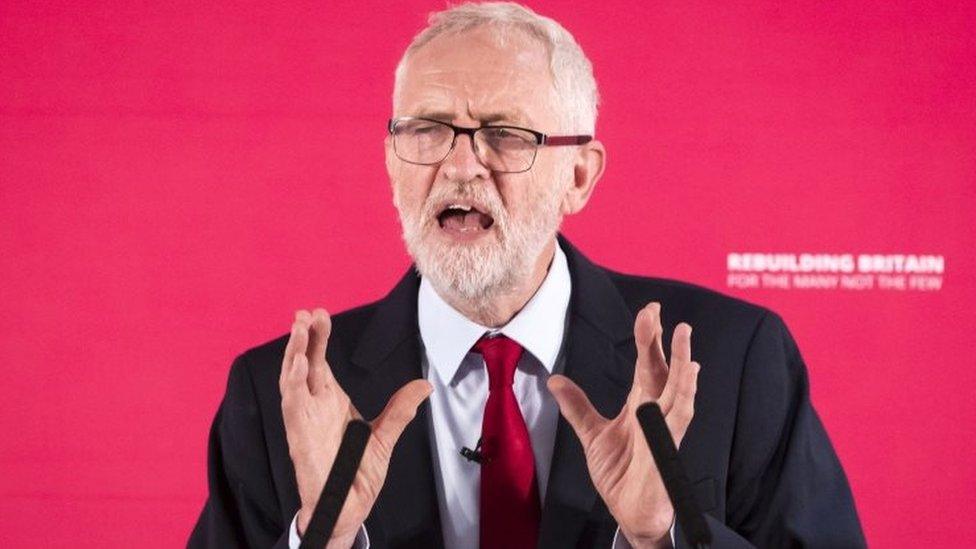Brexit: Cross-party talks over general election timing
- Published

Labour's Jeremy Corbyn is hosting a meeting with other opposition party leaders to discuss their approach to the timing of a general election.
MPs get another chance on Monday to vote for Boris Johnson's call for a snap election, after rejecting it earlier this week.
But Labour's Emily Thornberry called the PM "slippery", adding that he could use a poll as a "distraction".
Mr Johnson said Labour was uniting with the SNP to "lock us into the EU".
It is the end of a tumultuous week for the prime minister, who has suffered a series of defeats over Brexit in Parliament, expelled 21 of his own MPs for rebelling and seen his younger brother resign from government.
Jo Johnson quit as a minister on Thursday and announced he was standing down as an MP, saying he had been "torn between family loyalty and the national interest".
The prime minister's decision to prorogue - suspend - Parliament next week ahead of a Queen's Speech on 14 October is also being challenged in the courts in Scotland and Northern Ireland.
But campaigner Gina Miller has lost a judicial review she brought to London's High Court over the prorogation. However, permission has been granted for the case to be heard in the UK Supreme Court on 17 September.
Also on Friday, Mr Johnson travelled to Scotland to announce additional funding for farmers. He will later visit the Queen's Balmoral estate.
Meanwhile, a bill designed to prevent a no-deal Brexit is expected to finish its progress through the House of Lords.
Emily Thornberry told Today that FTPA election legislation can't be amended
Shadow foreign secretary Ms Thornberry told BBC Radio 4's Today programme that the possibility of having an election was "extremely attractive" but the "immediate crisis" of preventing a no-deal Brexit had to be dealt with first.
"If we vote to have a general election then, no matter what it is that Boris Johnson promises, it is up to him to advise the Queen when the general election should be," she said.
Ms Thornberry said Mr Johnson was "as slippery as can be" and could not be trusted over the timing of polling day.
She said that because Mr Johnson had said he would "die in a ditch" rather than delay Brexit beyond 31 October, "our first priority has to be that we must stop no-deal and we must make sure that is going to happen".
"We have a prime minister who is so unlike any other prime minister that we have had. In the past, if you passed a law you could be pretty sure the prime minister will abide by that law," she said.
"But we heard from the prime minister's own mouth that he will die in a ditch - obviously I hope he doesn't, but I actually hope he would obey the law."
But Mr Johnson said he would go to Brussels and get a deal so the UK can come out of the EU on 31 October.
He said resigning as prime minister if he did not get a Brexit deal by then was "not a hypothesis" he would be willing to contemplate.
Mr Johnson wants an early general election to take place on 15 October and he said he was "perplexed" by the decision of opposition parties to "run away" from an election.
"All I see is Corbyn and the SNP clubbing together to try and lock us into the EU when it's time to get this thing done," he said.
"It's the most sensational paradox - never in history has the opposition party been given the chance for election and has turned it down."
"You should be in Brussels; you're in Morley," a member of the public told Boris Johnson when he arrived
In a speech on Thursday, Mr Johnson argued an election was "the only way to get this thing [Brexit] moving".
But during his visit to the West Yorkshire town of Morley, a member of the public told Mr Johnson he should be negotiating the UK's exit from the European Union, not travelling around the UK.
'Not credible'
However, Theresa May's former chief of staff Gavin Barwell told the BBC's Brexitcast that Mr Johnson's Brexit strategy was not credible.
He said the government had been defeated in the most recent Brexit votes because "people do not believe there is a serious attempt at the moment to get a revised deal".
Mr Barwell said Mr Johnson's aim was "a very demanding one" as the government "hasn't published any detailed proposal that the EU can consider or that MPs can look at and go: 'Ok that's what we're trying to do.'"
In the Lords, peers will continue debating a Labour-backed bill designed to block a no-deal exit on 31 October, after MPs passed the legislation on Wednesday.
All stages of the bill are due to be completed in the Lords by 17:00 BST, at which point the bill can go back to the House of Commons before being presented for royal assent.
Meanwhile, a judgement is expected on a challenge to the suspension of Parliament brought by businesswoman Gina Miller and former Conservative prime minister John Major in England's High Court.
In Belfast, the Royal Courts of Justice will hear a separate case arguing that the suspension is unconstitutional. Meanwhile, a group of politicians in Scotland are attempting to overturn a court ruling made on Wednesday that the plan to shut down Parliament is legal.